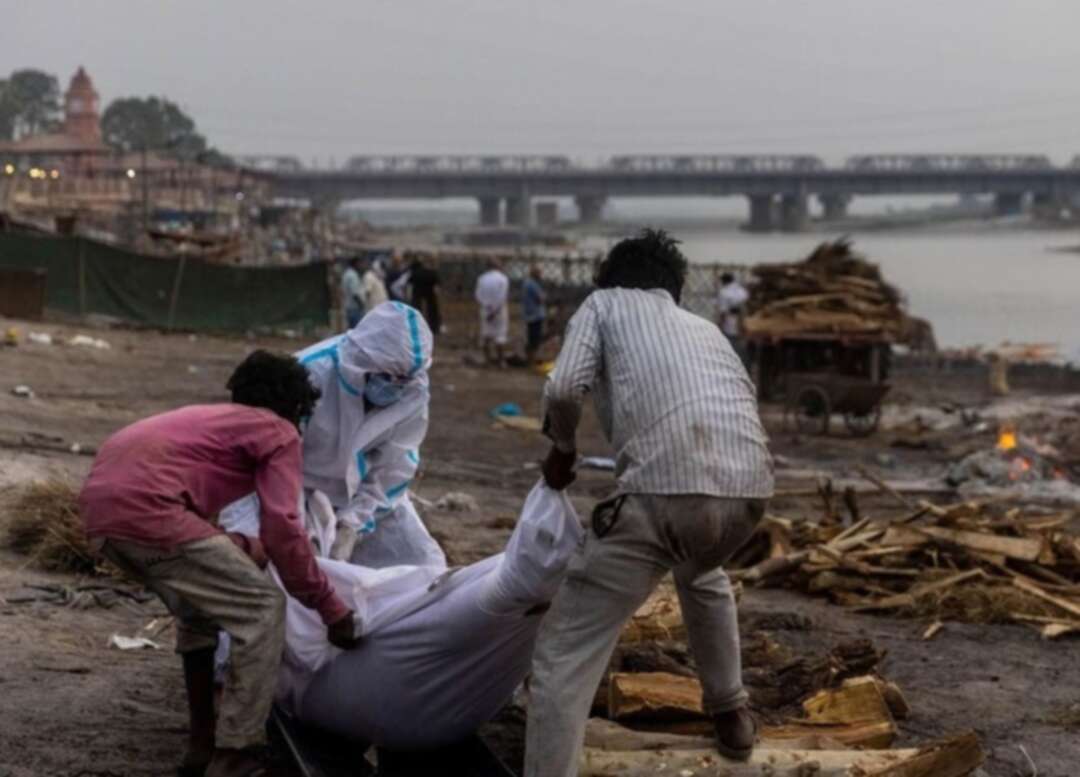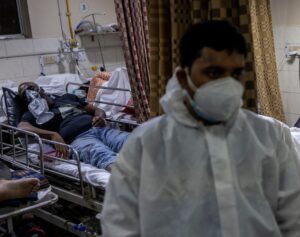-
India’s seven-day COVID-19 average at new high, WHO issues warning on strain

India’s coronavirus crisis showed scant sign of easing on Tuesday, with a seven-day average of new cases at a record high and international health authorities warning the country’s variant of the virus poses a global concern.
India’s daily coronavirus cases rose by 329,942, while deaths from the disease rose by 3,876, according to the health ministry. India’s total coronavirus infections are now at 22.99 million, while total fatalities rose to 249,992.
India leads the world in the daily average number of new deaths reported, accounting for one in every three deaths reported worldwide each day, according to a Reuters tally.
The seven-day average of new cases is at a record high of 390,995.
The World Health Organization said the coronavirus variant first identified in the country last year was being classified as a variant of global concern, with some preliminary studies showing that it spreads more easily.
“We are classifying this as a variant of concern at a global level,” Maria Van Kerkhove, WHO technical lead on COVID-19, told a briefing in Geneva on Monday. “There is some available information to suggest increased transmissibility.” Nations around the globe have sent oxygen cylinders and other medical gear to support India’s crisis, but many hospitals around the nation are struggling with a shortage of the life-saving equipment.
Eleven people died late on Monday in a government hospital in Tirupati, a city in the southern state of Andhra Pradesh, due to a delay in the arrival of a tanker carrying oxygen, a government official said.
“There were issues with oxygen pressure due to low availability. It all happened within a span of five minutes,” said M Harinarayan, the district’s top bureaucrat said late on Monday, adding the SVR Ruia hospital now had sufficient oxygen.
 People suffering from the coronavirus disease (COVID-19) are treated inside an overcrowded casualty ward at a hospital in New Delhi, India, May 1, 2021. (File photo: Reutesr)
People suffering from the coronavirus disease (COVID-19) are treated inside an overcrowded casualty ward at a hospital in New Delhi, India, May 1, 2021. (File photo: Reutesr)Sixteen faculty members and a number of retired teachers and employees who had been living on the campus of Aligarh Muslim University, one of India’s most prestigious, had died of coronavirus, the university said.
Adding to the strain on medical facilities, the Indian government has told doctors to look out for signs of mucormycosis or “black fungus” in COVID-19 patients as hospitals report a rise in cases of the rare but potentially fatal infection.
The disease, which can lead to blackening or discolouration over the nose, blurred or double vision, chest pain, breathing difficulties and coughing blood, is strongly linked to diabetes. And diabetes can in turn be exacerbated by steroids such as dexamethasone, used to treat severe COVID-19.
Doctors in the country had to warn against the practice of using cow dung in the belief it will ward off COVID-19, saying there is no scientific evidence for its effectiveness and that it risks spreading other diseases.
In the state of Gujarat in western India, some believers have been going to cow shelters once a week to cover their bodies in cow dung and urine in the hope it will boost their immunity against, or help them recover from, the coronavirus.
“There is no concrete scientific evidence that cow dung or urine work to boost immunity against COVID-19, it is based entirely on belief,” said Dr J.A. Jayalal, national president at the Indian Medical Association.
India’s second wave has increased calls for a nationwide lockdown and prompted a growing number of states to impose tougher restrictions, impacting businesses and the wider economy.
Production of the Apple iPhone 12 at a Foxconn factory in the southern state of Tamil Nadu has slumped by more than 50 percent because workers infected with COVID-19 have had to leave their posts, two sources told Reuters.
source: Reuters
Image source: Reuters
Levant
You May Also Like
Popular Posts
Caricature
BENEFIT Sponsors BuildHer...
- April 23, 2025
BENEFIT, the Kingdom’s innovator and leading company in Fintech and electronic financial transactions service, has sponsored the BuildHer CityHack 2025 Hackathon, a two-day event spearheaded by the College of Engineering and Technology at the Royal University for Women (RUW).
Aimed at secondary school students, the event brought together a distinguished group of academic professionals and technology experts to mentor and inspire young participants.
More than 100 high school students from across the Kingdom of Bahrain took part in the hackathon, which featured an intensive programme of training workshops and hands-on sessions. These activities were tailored to enhance participants’ critical thinking, collaborative problem-solving, and team-building capabilities, while also encouraging the development of practical and sustainable solutions to contemporary challenges using modern technological tools.
BENEFIT’s Chief Executive Mr. Abdulwahed AlJanahi, commented: “Our support for this educational hackathon reflects our long-term strategic vision to nurture the talents of emerging national youth and empower the next generation of accomplished female leaders in technology. By fostering creativity and innovation, we aim to contribute meaningfully to Bahrain’s comprehensive development goals and align with the aspirations outlined in the Kingdom’s Vision 2030—an ambition in which BENEFIT plays a central role.”
Professor Riyadh Yousif Hamzah, President of the Royal University for Women, commented: “This initiative reflects our commitment to advancing women in STEM fields. We're cultivating a generation of creative, solution-driven female leaders who will drive national development. Our partnership with BENEFIT exemplifies the powerful synergy between academia and private sector in supporting educational innovation.”
Hanan Abdulla Hasan, Senior Manager, PR & Communication at BENEFIT, said: “We are honoured to collaborate with RUW in supporting this remarkable technology-focused event. It highlights our commitment to social responsibility, and our ongoing efforts to enhance the digital and innovation capabilities of young Bahraini women and foster their ability to harness technological tools in the service of a smarter, more sustainable future.”
For his part, Dr. Humam ElAgha, Acting Dean of the College of Engineering and Technology at the University, said: “BuildHer CityHack 2025 embodies our hands-on approach to education. By tackling real-world problems through creative thinking and sustainable solutions, we're preparing women to thrive in the knowledge economy – a cornerstone of the University's vision.”
opinion
Report
ads
Newsletter
Subscribe to our mailing list to get the new updates!






















